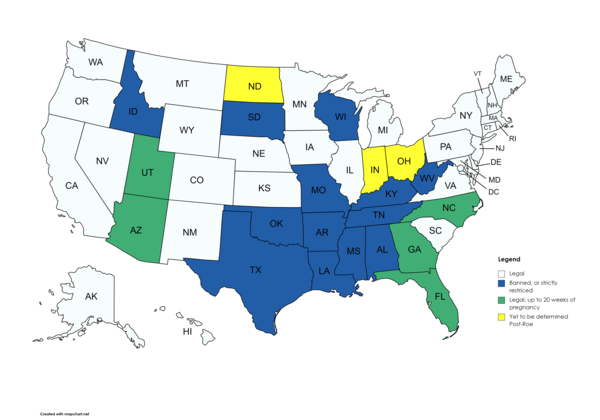
The U.S. is dramatically changing its course on abortion. On March 15, 2023, a medical organization, Alliance for Hippocratic Medicine, filed a lawsuit against the U.S. Food and Drug Administration (FDA) in an effort to ban Mifepristone, the most commonly used abortion pill nationwide. Although there have been multiple efforts to ban abortion over the last two decades, it seems different this time, as notoriously far-right federal Judge Matthew Kacsmaryk heard the case. The federal judge in Texas was appointed by ex-president Donald Trump and has been associated with conservatives and Christian interests for a long time. He has yet to decide whether to ban the pill nationwide.
Meanwhile, state-level changes in abortion are gaining momentum. Three days after the trial in Texas began, Wyoming Governor Mark Gordon signed into law a bill to illegalize the distribution and prescription of abortion pills. As of March 18, 2023, Wyoming became the first U.S. state to ban abortion pills. Under the law, women “upon whom a chemical abortion is performed or attempted” are exempt from prosecution, while doctors or pharmacists who provide chemical abortions are subject to a fine of up to 9,000 dollars and six months in prison. The law is scheduled to take effect on July 1, 2023.
While it is yet to be introduced—at least legally—in Korea, abortion via oral medication is the most common method of abortion in the U.S., accounting for more than half of overall cases. Furthermore, the availability of abortion pills has been considered a loophole for women who seek to terminate their pregnancy but live in the states where the procedure is illegal. They could cross the border to more abortion-friendly states, get a prescription, take the pills, and return home with little or no evidence of abortion. The ban on the medication is expected to affect almost every woman in the U.S.
The aforementioned changes in recent days seem to be in accordance with the ruling of the U.S. Supreme Court in June 2022, when it decided to overturn the famous “Roe vs. Wade.” Article 14 of the U.S. Amendment has a due process clause that stipulates that “no state can deprive residents of their lives, freedoms, or property without due process.” Based on this provision, the Supreme Court has developed a “substantive due process principle” that recognizes rights not explicitly mentioned in the Constitution as basic rights not only for “procedural due process principle” but also for “freedom” mentioned in the due process clause. Since abortion rights are not explicitly stipulated in the U.S. Constitution, a judgment regarding whether to recognize them as basic rights was required based on the principle of substantive due process.
The majority opinion suggested that in order for abortion rights, which are rights not explicitly mentioned in the Constitution, to be recognized as basic rights through substantive due process principles, it should be judged whether they are deeply rooted in American history and tradition. By applying this standard, the Majority Opinion noted that there was no U.S. law that supported abortion rights until the late 20th century, and in fact, most states have considered abortion a crime for a long time. Therefore, it was concluded that abortion rights were not deeply rooted in American history and tradition, and Article 14 of the Amendment ruled that abortion rights should not be protected.
Many states have implemented a near-total ban on abortion. Thirteen states passed a trigger law before the overturning of “Roe vs. Wade” that would outlaw abortion if decided by the Supreme Court.
How then is the American “abortion unfriendliness” going to affect Korea? Korea has “de-illegalized” abortion relatively recently among developed countries. The Constitutional Court of Korea decided in 2019 that outlawing the termination of pregnancy is “unconformable to the constitution.” The National Assembly did not introduce any alternative legislation in the following two years, and the article in Criminal Law to ban abortion was effectively terminated.
Complete legitimization, however, is in a stall. While there are no restrictions against abortion, there are also no specific laws supervising the procedure. What is certain is that the prescription of abortion pills continues to be illegal in Korea as the Ministry of Food and Drug Safety has yet to approve any oral medication for abortion.
Since Korea has been trying to announce legalization of abortion in recent years, there is limited possibility that Korea will turn to an abortion ban again. However, if the FDA retrieves its approval of mifepristone, it is possible that Korea might follow suit and allow only the invasive method for pregnancy termination. Officially, over 3,500 cases of abortion procedures on average have been performed in Korea over the last five years. The actual cases are estimated to exceed 10 times the number, suggesting that over 20,000 women underwent a dangerous procedure without any protection of laws or insurance.
Legal debates aside, the “Pro-life” versus “Pro-choice” discussion is ongoing in every country worldwide. Perhaps the agenda might have to move from “to allow or oppose abortion,” to “how to improve the situation and environment in which abortion occurs.” This will require continuous discussion in various aspects of society.

